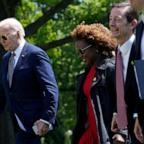Obama: U.S. closing chapter, not door, on Iraq
WASHINGTON -- President Obama hailed Iraq on Monday as a nation that will be seen as a beacon of democracy in the Middle East and vowed an enduring partnership with the nation as the last U.S. troops are set to leave Iraq this month.
"Our goal is simply to make sure that Iraq succeeds," Obama said at a joint news conference with Iraq's Prime Minister, Nouri al-Maliki, about the two countries' future relationship. "We think a successful and democratic Iraq could be a model for the entire region."
Obama and al-Maliki also visited Arlington National Cemetery on Monday to honor the more than 4,400 U.S. troops who have died in the Iraq War. The meeting comes as Obama puts a period behind the war he vowed to end when he was a presidential candidate. He and first lady Michelle Obama will visit Fort Bragg, N.C., on Wednesday to thank U.S. troops for their service and reflect on the mission's end.
As a little-known Illinois state senator in 2002, Obama referred to the Iraq conflict as a "dumb war," suggesting that the United States was losing sight of what was most important to American national security. White House press secretary Jay Carney reiterated on Monday that President George W. Bush's decision to invade Iraq diverted U.S. attention from the war in Afghanistan and the fight against al-Qaeda.
Obama was more measured Monday when asked whether Iraq was a dumb war.
"I think history will judge the original decision to go into Iraq, but what is absolutely clear as a consequence of the enormous sacrifice by American troops and civilians as well as the courage of the Iraqi people that what we have now achieved is an Iraq that is self-governing, that is inclusive, and that has enormous potential," Obama said.
At the height of the war, the United States had more than 170,000 troops and more than 500 bases and outposts scattered throughout Iraq. Although the U.S. military presence soon will officially end, the American diplomatic presence will remain enormous with about 16,000 personnel — including civilian security contractors — assigned to Iraq.
The robust American diplomatic presence has angered some Iraqis. But Obama said Monday that the embassy's size reflects both Iraq's importance to the United States and the reality that the country is just a few years out from the fiercest battles of the war.
Earlier this year, White House officials indicated they were willing to leave behind a small number of troops beyond the end of this year to help train Iraqi forces. Obama announced in October that all troops would leave by Dec. 31, after it became clear Iraq's parliament would not renew legal immunity for U.S. troops operating in the country.
Al-Maliki said Iraq will still need U.S. help to train and equip Iraqi forces, as well as international expertise to tap fully its oil wealth. Iraq is buying more than $10 billion worth of U.S. weapons, including M-1 tanks, F-16 fighters and armored vehicles.
Obama and al-Maliki have diverging opinions about the Bashar Assad regime in Syria: Obama says the president should step aside, while al-Maliki has tried to steer clear from irritating his neighbor.
Despite differences in opinion, al-Maliki suggested that the U.S. relationship remains strong.
In Baghdad, Vice President Tariq al-Hashemi said in an interview that it might be possible sometime in the future to bring U.S. military trainers back to Iraq, but not in the near term.
"At this particular time, we're very sensitive to the credibility of the United States," al-Hashemi said. "We are pleased to see the United States not playing games with the Iraqi people."




